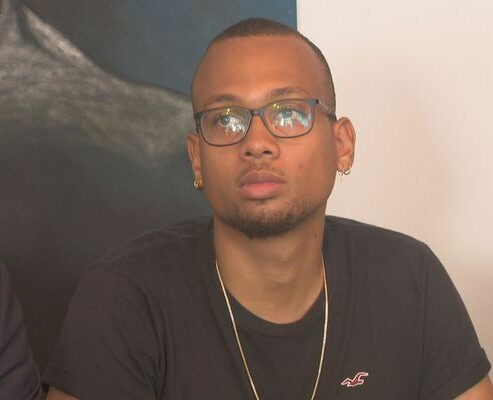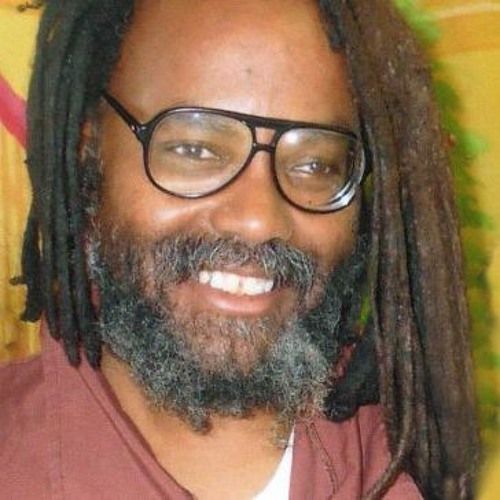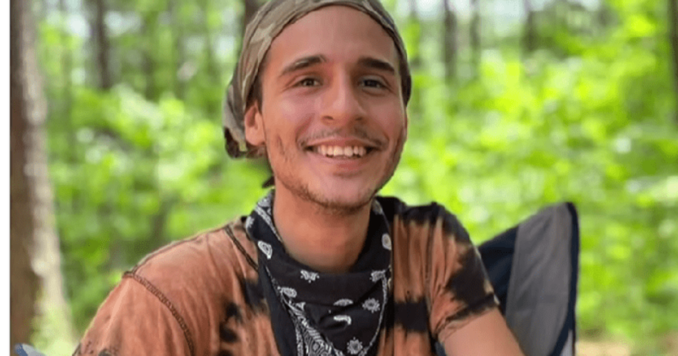Portrait of the eco-defender as a young man
By Julia Wright
The one is an elder behind bars.
The other is a young man who lives thousands of miles away. Perhaps he had heard of the elder, who is also known as the “voice of the voiceless.” Perhaps he had seen his photograph or heard from his mother, Madly Etile, about the details of his 42-year ordeal in prison as an innocent man, framed for his political opinions.

Keziah Nuissier
The one is African American and speaks the language of the English colonizer. The other hails from the French colony of Martinique and speaks the language of the French colonizer.
Both Black, both militant, they were and continue to be exposed to the prerequisites of genocide: environmental racism, dispossession, recolonization of the mind, arbitrary violence and arrest, torture and extrajudicial killing.
The elder is named Mumia Abu-Jamal.
The youth, who could be his grandson, is named Keziah Nuissier.
Both were exposed to and targeted by what I call the constant and repetitive “6 x C” of police narratives, rubber-stamping guilt on those who cannot afford the luxury of innocence:
- C for crime scene obliteration and bodycam sabotage;
- C for criminalization and character assassination of the victim;
- C for corporate press complicity with the State and the criminal justice system;
- C for corruption and bribing of witnesses;
- C for charging the victim with conspiracy with other “usual suspects”
- C for the cruel and unusual treatment of torture.
What should interest us is what brought these two men together and what brings both of them to support the Forest Defenders in Atlanta, because then we will start to grasp the exploitative profit-seeking geopolitics, the intergenerational experience and ancestral links at work in the unification of a global radical eco-resistance.
Environmental racism and the Prison Industrial Complex
Prisoners like Mumia Abu-Jamal and Bryant Arroyo in Pennsylvania know the importance of environmental racism to the Prison Industrial Complex (PIC); U.S. prisons are built on the cheapest land, near toxic waste dumps and fracking sites. The Abolitionist Law Center has closely mapped the proximity of the state’s prisons to clusters of a rare type of cancer.

Mumia Abu-Jamal
So abolitionists monitoring the human rights of prisoners and all vulnerable detainees — elders, [people with disabilities] — are vigilant [with regard] to the intersection between environmental racism and carceral abuse. However, this is not the only reason our struggle to dismantle the PIC is inseparable from the struggle to prevent the targeting of ethnic minorities through ecocide.
We pay attention to eco-struggles everywhere, because our political prisoners are warehoused away like plastic bags or radioactive waste behind prison walls.
In fact capitalism — and the imperialist thrust it cannot survive without — practices its own kind of criminal “ecology”: it does pay attention to the disposal of the “products” it considers as waste; it does make sure that what it considers as toxic materials are warehoused — except that the “pesticides” they dump are human beings, mostly Black, Brown, Indigenous and poor human beings.
We become their recyclable trash — their “Soylent Green,” to refer back to the sci-fi film where Charlton Heston’s elderly uncle, Edward G. Robinson, disappears only to reappear in a factory where old folks are recycled to make [food]. Strangely familiar? But then, made-in-USA sci-fi is itself a recycled myth to justify the repetition of past horror.
Carcinogens dumped on Martinique
This is how the attention of the Mumia coalition was drawn to the struggle of the people of Martinique against the dumping on their island of 300 tons of the carcinogenic pesticide called Chlordecone over the past few decades.
The struggle of African Americans against white supremacy owes so much to the insights and practice of the Martinique-born freedom fighter and psychiatrist, Frantz Fanon, that any ordeal undergone by his native island is bound to attract our attention and our solidarity.
The illicit use of Chlordecone on export crops, authorized by the French state and the local “Béké” settlers in the colony, has by now poisoned 95% of the land and waterways — for centuries to come, according to independent experts. Chlordecone is so toxic that it was even outlawed in the U.S. back in the 1970s. Chlordecone is an organochlorine-persistent pesticide [meaning it is highly resistant to degradation and can remain in the soil for many years] and an endocrine disruptor with irreversible carcinogenic effects.
The small island of Martinique today has the highest rate of prostate cancer in the world — and it affects the reproductive organs of men and women exponentially. They are a people in slow-motion genocide through calculated and mercantile ecocide.
In the aftermath of the 2020 worldwide outcry sparked by George Floyd’s killing, protests had reached the French West Indies — Martinique, Guadeloupe and Guyane, etc. More than 30 cities in mainland France were heavily affected, and the statue of Jean-Baptiste Colbert in front of the French National Assembly in Paris was defaced. Colbert was a Minister of King Louis XIV and author of the Black Code, a handbook legalizing the French slave trade.
Back in Martinique, on July 16, 2020, several youth eco-protesting the use of Chlordecone had been brutally arrested by the colonial “gendarmes” (militarized mobile guards).
Keziah Nuissier, aged 22, and his mother, Madly, went to a peaceful protest that afternoon to make sure the defendants who were to appear in court were not brutalized by the military police.
Keziah is a talented percussionist. A photo of him playing an ancestral drum, with his mother standing protectively behind him in front of a line of shielded, armed and masked gendarmes ready to charge went viral.
Another case of police brutality
They did charge, in an attempt to seize the protesters’ sacred drums, hitting Keziah’s mother in the breast and breaking her arm with a Flash-Ball. When Keziah tried to shield her with his body, he was seized, thrown to the ground, beat to a pulp and then dragged behind the police van, where he was tortured and abused by racial slurs. The optic nerve in one of his eyes was sectioned, in the tradition used by French army officers in Algeria against the national independence liberation movement. Keziah has had to beat blindness.
All this was filmed by an incensed protester from the vantage point of a building. When the officers — a plainclothes special unit member was in charge — realized it, one of them simply removed a spray can from the van and started to clean the bloodied street, while the unconscious Keziah was left to bleed out in the van. When he was taken to the hospital, instead of getting immediate medical care, he was rearrested and thrown into jail, under the pretext that he had assaulted his captors. It took a mass protest to get him released and cared for at last.
There were other arrests that day. Keziah always names them: Dalsim, Lulu and Volkan.
Years of PTSD later, in spite of a brilliant defense team and footage that showed the zeal of the colonial police officer specially deployed to make the street look more photogenic, Keziah has just written to me that the charges against him have still not been dropped. Nor have his torturers been incriminated.
By the time details of Keziah’s ordeal reached Mumia in his prison, Mumia had been diagnosed with congestive heart failure. But he was adamant that he must record a message of solidarity for young Keziah. He said in part, his voice breathless from his heart condition:
“Generations ago the U.S. civil rights movement was born by the brutality and torture and drowning death of a teenage boy, Emmett Till. Today a global human rights movement was born by the slow-motion police violence and brutality against George Floyd, who died in his 40s. George Floyd . . . He died by a knee on his neck.
“From a teenager to a man in his 40s, the repression is the same, the racial hatred is the same, the deadly result is the same. . . .
“Free Keziah! Free Keziah”
Keziah survived his torture at the hands of the French special police. His eyesight survived the sectioning of his optic nerve. But most of all, Keziah has survived the attempt to silence him, because, in the end, torture has two main goals: to extract confessions, mostly false ones, and to section our narrative, silence us.
Solidarity with Tortuguita’s loved ones
When I sent him the news about Tortuguita’s death at the hands of the Georgia State troopers and about the eco-movement in the Atlanta forest, and suggested he might contribute a support statement for the Forest Defenders against Cop City, I sensed his response would not be a given.

Manuel ‘Tortuguita’ Teran
I waited. I think I understood what it must be like for a young torture survivor, who had stared death in the face, to find words for a peer who did not survive.
So he would be forgiven in advance for his silence.
I waited nearly two weeks and had stopped waiting.
Still, I sent him the first very partial bodycam images released by the Atlanta Police Department on Feb. 8, and within hours, breaking his silence, he wrote back verbatim:
“Sister, it is with tremendous sorrow that I receive from you the news of the disappearance of a militant [sibling], we wholeheartedly support the family and friends of Manuel ‘Tortuguita’ Teran in the face of this tragic event. Tortuguita’s murder is an umpteenth demonstration of the cruelty and barbarism shown by the system against those who dare stand up to it. Both internationally and in Martinique, the repression of activists is everywhere to be found.
“We must form a common front in the face of the disorder of the forces of order and the travesty of criminal justice. It is together that we can change things. We stand in unwavering condemnation of their maneuvers, and we demand justice for Manuel and their family. We will remember Manuel ‘Tortuguita’ Teran as an activist defender of Nature and human freedoms.”
Today, Keziah is 25 years old and preparing an English MA. He knows the weight of each word with which he broke the silence he was supposed to be tortured into. He also knows his Martinique gave birth to the author of “The Wretched of the Earth” — and somewhere that motivates him even more to struggle against the poisoning of Fanon’s native soil.
He still hopes the trial of those who tortured him and charged him with assault will take place. But he also knows that the French state is dragging out procedures so that amnesia will prevail.
Like so many students in the U.S. and worldwide, as a student himself, he too is aware that between March 4 and 11, campuses will be moving to stop Cop City.
I would like to zoom back to the young man in “Soylent Green,” seeking out his elder, who is destined to be recycled in the [Soylent company] factory and then to the viral footage of Keziah’s mother, Madly, hovering protectively over him as he plays the ancestral drum in the face of bayonets and guns.
There may be perhaps a message here for the unity of our eco-struggle wherever it is waged. We speak of intergenerational trauma and how it is passed on. So how is the awareness of genocide being committed in real time passed on, if the very goal of genocide is to eradicate both life and its legacy? Looking at this mother-and-son footage, with the knowledge that the son tried to protect his mother from the Flash-Balls as she had his back while he honored the ancestors, among them Fanon, we can speak of intergenerational, ancestral and global planet defense in action.
Then I zoom forward to Keziah’s 136 words for Tortuguita three years later, and I know that however urbane and controlled they may seem — they are wrested from blood and torn from colonial state-imposed silence.
May the breaking of silence everywhere be planted like the trees capitalism is felling.
(c) Julia Wright, Feb. 15, 2023

